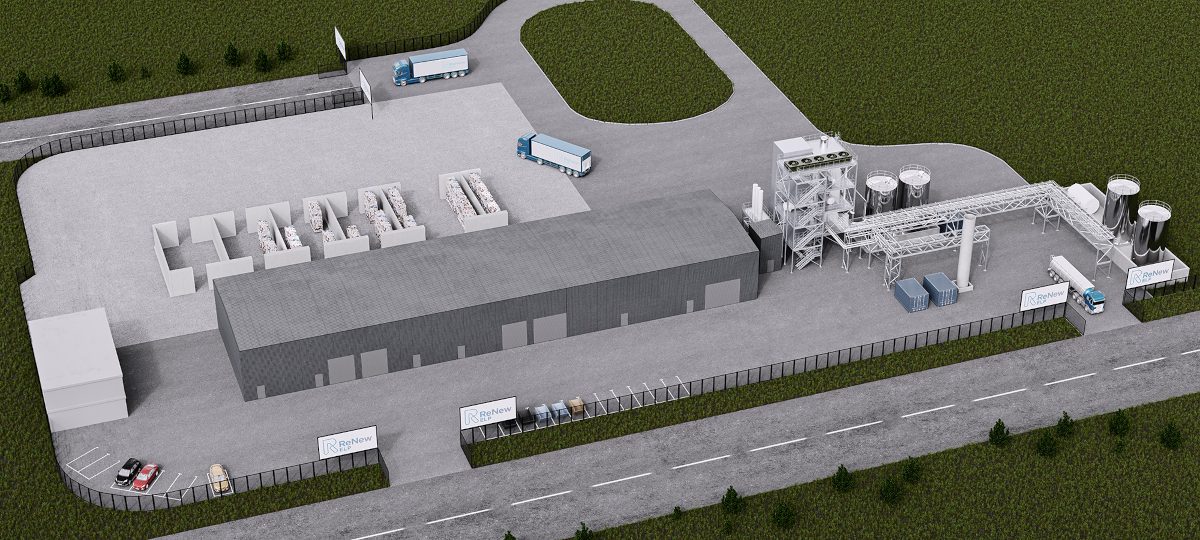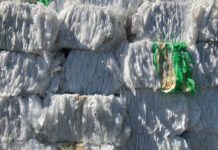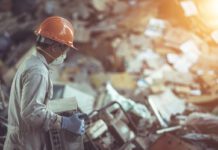· New HydroPRS™ process creates raw ingredients for “infinitely recyclable new products”
· World-first commercial-scale plant starts construction in Teesside, UK, backed by global partners and UK Government.
· Plans for one million tonnes of capacity in development worldwide by 2025.
Mura Technology, a UK-based technology firm, has announced that construction has started on the world’s first commercial-scale plant to use its ground-breaking “hydrothermal” process, which is said to be able to recycle all forms of plastic waste and could provide the raw ingredients for a sustainable circular plastic economy. HydroPRS™ (Hydrothermal Plastic Recycling Solution) is described as a revolutionary advanced recycling process designed to tackle plastic that cannot currently be recycled.
The first plant to use the technology has begun construction in Teesside, UK, to be operational in 2022 and able to process 80,000 tonnes of plastic waste per year. Mura says it will form the blueprint for a rapid global rollout that will see one million tonnes of capacity in development worldwide by 2025 – equivalent to nearly half the plastic packaging waste produced in the UK each year.[i] Sites are planned in Germany, the US and Asia.
Plastic waste is an urgent environmental challenge; 350m tonnes of plastic is produced worldwide annually,[ii] with half becoming waste in less than a year.[iii] The UK alone produces 2.4m tonnes of plastic packaging – the second highest per capita in the world.[iv] Yet globally only 9% of plastic has ever been recycled – the vast majority (79%) currently ends up in landfill or the environment[v] and 8m tonnes enters the oceans every year,[vi] predicted to increase tenfold by 2025 if solutions aren’t found.[vii] This ‘lost resource’ of plastic waste is a huge economic opportunity – valued at up to $120bn per year according to the World Economic Forum.[viii]
Mura’s proprietary HydroPRS™ process uses supercritical steam to convert plastics back into the oils and chemicals they were made from, ready to be used for new virgin-grade plastic products. It can recycle all forms of plastic – including ‘unrecyclable’ products such as multi-layer, flexible plastics used in packaging – with no limit to the number of times the same material can be recycled. This means it has the potential to eliminate single use plastic and make the raw ingredients for a circular plastics economy, creating value, not waste.
Global plastic production also creates an estimated 390m tonnes of CO2 every year[ix] – equivalent to over 172m cars.[x] It accounts for 6% of global oil consumption today and is set to increase to 20% by 2050.[xi] Advanced recycling processes reduce the need for fossil fuel extraction for virgin plastics. In addition, they can save approximately 1.5 tonnes of CO2 per tonne of plastic recycled compared to incineration.[xii] On completion, the Teesside plant has the potential to eliminate up to 120,000 tonnes of CO2 per year, compared to incineration of the same plastic waste.
Dr Steve Mahon, CEO of Mura Technology, said: “We are at the tipping point of an environmental catastrophe – it’s time to seize the initiative and put an end to plastic pollution across the world. HydroPRS™ represents a win-win for the environment, economy and society, helping keep our environment free from plastic and oil where it belongs – in the ground.
“We need to act now and that’s why we’re taking a global-first approach – to scale fast and meet the challenge head on. We’re working with global partners to deploy our unique HydroPRS™ process where it’s needed, today, to create a sustainable future and eliminate plastic pollution.”

To support its deployment, Mura has announced a series of global strategic partnerships. In January, the company signed an agreement with KBR Inc. to license the technology to its clients worldwide. KBR has also invested in the company. Igus GmbH. has partnered with Mura via a strategic investment to support the world-first plant in Teesside. Wood has been appointed as the EPC contractor for the Teesside project, the first site to use Mura’s HydroPRS™ process. The Teesside project is being developed by ReNew ELP, the UK subsidiary of Mura Technology.
In October 2020, the Teesside project was awarded £4.42m by the UK Government via the Industrial Strategy Challenge Fund’s Smart Sustainable Plastic Packaging programme. Earlier this month, advanced recycling was for the first time recognised as contributing to government targets for recycled plastics and supporting measures such as the proposed plastic tax for recycled content in packaging.
Rebecca Pow MP, Under-Secretary of State for Defra said: “The Government is committed to both clamping down on the unacceptable plastic waste that harms our environment and ensuring more materials can be reused instead of being thrown away. By investing in these truly ground-breaking technologies, we will help to drive these efforts even further, and I look forward to seeing them develop and deliver real results.”
The concept has also been backed by environmental groups campaigning to tackle the plastic waste crisis.
Jo Ruxton, Founder of Ocean Generation and producer of Netflix documentary A Plastic Ocean, said: “More than eight million tonnes of plastic enters our oceans each and every year – that’s unacceptable. It’s paramount that we live more sustainably with plastic, reducing our need for it in the first place and then finding ways to stop it entering our precious environment. Technologies like this are a big piece of that jigsaw.”
The scale to solve the plastic crisis?
Mura’s HydroPRS™ process, utilising at its core the Cat-HTR™ technology, developed and owned by Licella Holdings Limited, breaks down plastics using water in the form of supercritical steam (water at elevated pressure and temperature). The steam acts like molecular scissors, cutting longer-chain hydrocarbon bonds in plastics to produce the valuable chemicals and oils from which the plastic was originally made – in as little as 25 minutes.
These oils – equivalent to the original fossil products – are then used to produce new, virgin-grade plastic with no limit to the number of times the same material can be processed, creating a true circular economy for waste plastic. Importantly, the products may be suitable for use in food-contact packaging, unlike conventional recycling processes.
The steam acts like molecular scissors, cutting longer-chain hydrocarbon bonds in plastics to produce the valuable chemicals and oils from which the plastic was originally made…
Most recycling today uses mechanical methods that can degrade the quality of the plastics – a process often referred to as ‘down-cycling’. They are also unable to recycle various common forms of waste plastic. Mura’s process can recycle all waste plastics, including those considered ‘unrecyclable’, such as films, pots, tubs and trays, that can currently only be incinerated or sent to landfill. The process is designed to work alongside conventional recycling and wider initiatives to reduce and reuse plastic.
Using supercritical steam means the technology is also inherently scalable. Unlike other methods, which heat waste from the outside, the steam imparts energy from the inside, providing far more efficient conversion of plastic waste; a process which can be maintained regardless of scale.
A solution for global brands to eliminate plastic waste?
In the face of rising consumer pressure, the world’s largest brands are urgently looking to tackle their plastic problem. Unilever has committed to halve the amount of virgin plastic in its packaging by 2025 and increase recycled content by a quarter. Nestlé has committed to 100% recyclable or reusable packaging by 2025 and reducing virgin plastic by a third. However, meeting these targets needs technologies capable of recycling all plastics to create infinitely recyclable products.
Mura says it is in advanced discussions with global brands and investors to fund and deploy HydroPRS™ and use the raw ingredients it creates to eliminate the need for new virgin plastic, meeting consumer demand for action.
“The problem isn’t plastic, it’s where it ends up. We want to change the way the world thinks about plastics – not as something to throw away, but as a valuable resource that can be reused over and over without harming our natural world,” concluded Dr Mahon.
Notes
(i) WRAP – Plastics Market Situation Report 2019
(ii) Plastics Europe – Plastics: The Facts 2018
(iii) Plastic Oceans UK – Key Facts on Plastic Pollution / Plastic Oceans: The facts
(iv) The Guardian – “US and UK citizens are world’s biggest sources of plastic waste – study”
(v) Production, Use and Fate of All Plastics Ever Made. Science Advances Research article. Asci. Adv. 2017; R. Geyer, J.R. Jambeck, K.L Law
(vi) The Ellen McArthur Foundation – The New Plastics Economy: Catalysing Action
(vii) JR Jambeck et al. – Plastic waste inputs from land into the ocean 2015
(viii) WEF – The New Plastics Economy: Rethinking the Future of Plastics
(ix) The Ellen McArthur Foundation – The New Plastics Economy: Catalysing Action
(x) https://www.gov.uk/government/publications/new-car-carbon-dioxide-emissions
(xi) The Ellen McArthur Foundation – The New Plastics Economy: Catalysing Action







